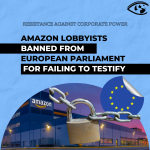EU: Biotech Food Tears Rifts in Europe
In this famously fractious country, there is one thing on which almost all Greeks agree: They do not want genetically modified crops grown, sold or eaten here.
"All political parties are opposed," said Theodore Koliopanos, a legislator and former deputy environment minister, "which is odd because we disagree on everything else."
Greece and a few other countries in the European Union that have banned genetically modified organisms are on the front lines of a war over the future of modified food in Europe, the only large swath of the world that does not already grow or buy the crops. Facing international pressure and a lawsuit brought by the United States, Canada and Argentina at the World Trade Organization, the union said this year that all member states must open their doors to genetically engineered crops and prepare practical and legal regulations to ensure safety for health and the environment.
But five countries have imposed eight different types of bans. Many others use their votes in Europe's Council of Ministers to block the crops from entering.
The battle does more than pit the World Trade Organization against the European Union. It also creates a divide across the Atlantic, between European allies on the one hand, and the United States and Canada, which produce the vast majority of such seeds and crops, on the other. The United States is not shy about enlisting its diplomats to push European countries to admit the modified crops, European politicians say.
But European consumers and farmers generally do not want them, leaving the European Union to try to steer a Solomonic course between conflicting interests. The basic problem is that Europeans, whose food culture has developed over centuries, balk at putting biotech crops in their fields or their mouths.
"We think we have a good policy but we have discovered extreme reluctance among consumers and many member states to move forward with G.M.O.'s, who again and again block the approvals," said Barbara Helferrich, a spokeswoman for the union's Environment Directorate.
Since the union is a common market, lawmakers in Brussels demand a unified solution. So a seed that is sold in Britain has to be sold in Poland and Greece as well. But critics say that countries should be permitted to decide if they will accept a risk, however small, noting, for example, that unpasteurized milk is legal in France but not in Britain.
But while there is little, if any, scientific evidence that genetically modified foods are harmful, in much of Europe they are so unpopular that mainstream supermarket giants like Migros will not stock them. In surveys, consumers say they are unconvinced that genetically modified crops are safe, particularly for the environment.
"The environment minister who gives in and allows G.M.O.'s into this country will never be minister again," said Nikos Lappas, head of Greece's largest farmers' union. "For farmers, forcing G.M.O.'s would be economic suicide, since our market doesn't want them."
But producers of genetically modified products (and the countries they represent) are aggressively pursuing their case at the W.T.O. and with individual governments, spurred by an untapped European market.
"The first visit any new minister in Greece gets is from the U.S. ambassador saying, 'You need to have G.M.O.'s,' " said Mr. Koliopanos. "The pressure is incredible."
Biotech companies like Monsanto and Syngenta insist that the crops should be immediately admitted to Europe, because genetically engineered foods have been consumed in much of the world for a decade without obvious ill effects. Their safety, said Christopher Horner, a Monsanto spokesman, has been "ratified by numerous credible regulatory and scientific authorities."
Simon Barber, of EuropaBio, an industry group in Brussels, said: "The E.U. has put systems in place to deal with G.M.O.'s, and now the market has to be allowed to operate. If member states are breaking E.U. law, we expect the commission to take action."
The office of the United States trade representative maintains that "the E.U. is imposing undue delays on biotech approvals, resulting in delays and preventing the marketing of many crops grown in the U.S." The United States grows 220 million acres of genetically modified crops - by far the world's leader - and almost none of it is sold to the European Union. From 1998 to 2004, the European Union imposed a de facto moratorium on farming of genetically modified crops while its officials studied the issue and mulled ways to keep biotech crops and other crops distinct.
Genetically engineered seeds and plants contain genes that were inserted in a laboratory that give them special advantages, like resisting common pests. But pollen from those crops can spread in the air from field to field, intermixing with pollen from conventional crops.
Once genetically modified crops enter a country's food production, it can be difficult and costly to keep the food chain free of them because there is mixing of plants from farms in milling and in production.
Greece and other European Union members say such issues make any cultivation of biotech plants impossible because they would quickly infiltrate both agriculture and the food supply. In much of Europe, where small farms are the norm, it is hard to create "buffer zones" between fields on adjacent farms.
"I would guess we may be able to keep them apart in U.K., but it would be difficult in Greece because of the issue of size," said Julian Kinderlerer of the Institute of Biotechnical Law and Ethics at the University of Sheffield in England.
Europe's agricultural insurers will not cover farmers for liability should their genetically modified crops contaminate adjacent fields.
"I started with an open mind on this but now I think the answers are clear," said Mr. Lappas, of the Greek farmers' union. "If our market doesn't buy it, and insurers won't insure us, how can we grow it?" Indeed, in many areas that have blocked genetically engineered crops, small farmers survive by producing niche food, like unique, high-quality vegetables and grain; there is a premium for food that is not genetically modified.
"This is a cutthroat global market, and if all we do is cultivate mass-produced G.M. corn, we're finished, since other nations will be able to provide that cheaper," Mr. Lappas said.
In Poland, 1.5 million farms are still mostly farmed without pesticides, giving that nation the opportunity to become an important producer of natural foods, according to the International Coalition to Protect the Polish Countryside, which has lobbied for a national ban.
To the biotech industry and major producers, the issue is simple: genetically modified corn is just corn, genetically modified wheat is just wheat and there is no scientific reason to differentiate.
Industry groups argue that products should not even be labeled modified or free of modification because the labels are unfair trade barriers.
"Labeling has turned out to be a stigma because the public is so frightened, and retailers have become easy targets," said Mr. Barber, of EuropaBio. "Look at the Greenpeace Web site with its list of brands that use G.M.'s. We're O.K. with consumers making a choice, but we're leery because they're scared, and we're labeling identical products."
Genetically modified seeds are approved case by case, and once the European Commission has approved a seed for planting, the only legal reason that a country can enforce a ban is if "new scientific evidence" shows it would be harmful.
But recently, each time the commission has approved a new product, the Council of Ministers (representing the member states) has voted against it, creating an impasse.
In addition, some countries still say modified seeds are unsafe, invoking the so-called scientific exception.
"They haven't provided any new evidence," said Michael J. Phillips, a vice president of the Biotechnology Industry Organization in Washington.
The European Food Safety Authority of the European Union provides scientific judgments on matters like new evidence. The European Commission and the Council of Ministers have also referred their impasses to the safety agency.
But this agency's core mandate concerns food safety, and even the union's environment commissioner, Stavros Dimas, said recently that it had not looked adequately at the long-term effects of biotech crops on issues like biodiversity.
At a recent meeting with disgruntled member states in Brussels, Harry A. Kuiper, chairman of the agency's panel on genetically modified crops, defended its work, noting that its experts had just six months to review each submission.
The European Union still hopes to win over reluctant members, and so far has taken none to court. But environmental groups vow to resist any pressure from Brussels.
"The E.U. policy of just pushing forward with the technology is utter blindness," said Helen Holder, a spokeswoman for Friends of the Earth in Europe. "Genetic contamination is unavoidable and irreversible and will only increase over time."
- 192 Technology & Telecommunications



